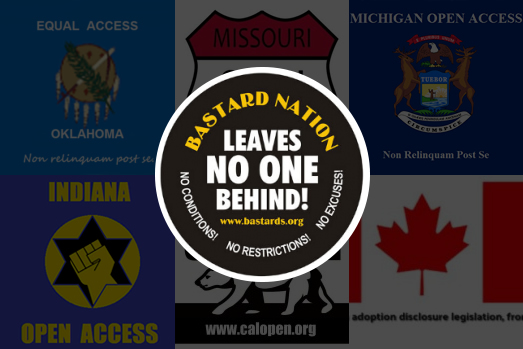Bastard Nation: the Adoptee Rights Organization
PO Box 4607
New Windsor, New York 12553-7845
bastards.org 614-795-6819 @BastardsUnite
bastardnation3@gmail.com
Submitted Comments
HB 1231
South Dakota Senate Health and Human Services Committee
February 27, 2023
Marley E. Greiner, Executive Chair
Bastard Nation: the Adoptee Rights Organization is the largest adoptee civil rights organization in the United States. We support only full unrestricted access for all adopted persons to their original birth certificates (OBC) and related documents.
We support HB 1231 as written; a “clean bill” with no restrictions to access by South Dakota- born adoptees 18 years of age and older.
The House has aleady passed this wonderful bill, and we urge you to do the same.
Current Law v HB 1231
Current law requires South Dakota’s adopted people run a bureaucratic gauntlet that costs the state and its courts unnecessary time and money in fulfilling the request with no guarantee to adoptees that the OBC will actually be released.
This is the current procedure taken from the South Dakota Department of Social Services website:
South Dakota law allows only the adoptee and the adoptive parents to open sealed adoption files (SDCL 25-6-15). To open a file, the adoptee must petition the court where the adoption was finalized to receive a court order. The Department of Social Services’ Division of Child Protection Services and the Department of Health’s Vital Records must sign off on the petition.
- As an adoptee, you can contact the Division of Child Protection Services’ Adoption Unit at 605.773.3227 to assist you with the petition.
- Once you receive the petition, take it to the judge of the court where your adoption was finalized.
- Once you receive the certified court order from the judge, send it to the agency which placed you to receive your adoption records.
HB 1231 does away with this convoluted legal process by separating the OBC—which sometimes is not actually part of the adoption file–from the adoption file. Adoptees would simply fill out a request form and submit it directly to the appropriate department with a nominal fee. The document would be released without condition, restriction, and court vetting—comparable to how the Not Adopted receive their birth certificates. The ability to obtain the adoption file would be retained under a separate legal procedure.
It is important to note that many adoptees do not know what private or public agency handled their adoptions.
Privacy and The Balance of Rights
HB 1239 is not about search and reunion,though search and reunion can happen The bill is about civil rights.
We often hear the term “balance of rights” in the OBC debate. That can be a legitimate debate in cases where an actual conflict of rights among parties exists. In the case of OBC rights, however the only rights involved are those of thousands of adopted people in South Dakota who are legally banned from obtaining the genuine unaltered record of their birth.
There is no “balance of rights” here. Everyone born in South Dakota except those who are adopted have an unquestioned right to obtain their own birth certificate upon request and a nominal fee. The current sealed records practice confers upon the documents and the adopted people who whom they pertain, with some kind of personal and political stigma.
This is about adoptee rights only. No other right exists. Rights and interests are unequal. A few birthparents—and in a broader sense, third parties with no standing– may argue a “right” to birthparent anonymity, but courts have found there is no such right. These parties might have an “interest” (or think they do), but “rights” trump “interests.” The Adopted and the Not Adopted have an absolute right to obtain the official state record of their own birth and no third party–parent or not–has the “right” to bar that access. Critically, parental rights were voluntarily relinquished years ago or were terminated by a court, so if there was even such a parental “right” it would not exist in the case of adoption.
Adoption Privacy Overview
“Privacy” “confidentiality,” and” anonymity” are not synonymous either legally or linguistically. “Anonymity “is a myth perpetuated by special interests that for decades have profited off of economic distress and society-induced shame and family crisis. In many cases, adoption is a permanent solution to a temporary problem that has not only individual but generational consequences.
There is no evidence in any state that records were sealed to “protect” the reputation or “privacy” of biological parents who relinquished children for adoption. On the contrary, records were sealed to cover coercive child acquisition practices by adoption agencies, black and gray market baby dealers, exploitative assembly-line maternity homes, and other corrupt systems. Numerous historical and legal researchers and writers have shown that OBCs were never intended to be sealed in perpetuity from individual adoptees as adults. At “best” sealed OBCs were billed as a way to protect the reputations of “bastard children” (not adults) and to protect adoptive families from birthparent and stranger interference. These documents were first sealed from the public, then the parties to the adoption, and eventually to adopted people themselves. What was once an outlier practice has now been normalized through a mix of myth and “tradition” and treated like ”the way it’s always been.”
Courts , however, have ruled that adoption anonymity does not exist. (Doe v Sundquist, et. al., 943 F. Supp. 886, 893-94 (M.D. Tenn. 1996) and Does v. State of Oregon, 164 Or. App. 543, 993 P.2d 833, 834 (1999). Laws change constantly, and the state, lawyers, social workers, and others were never in a position to promise anonymity in adoption. In the over 60 years of the adoptee equality battle, not one document has been submitted anywhere that promises or guarantees sealed records and an anonymity “right” to birthparents.
Identifying information about surrendering parents often appears in court documents given to adoptive parents who can at any point give that information to the adopted person. (In some states adoptive parents, at the time of the adoption order, can petition the court to keep the record open.) The names of surrendering parents are published in legal ads. Courts can open “sealed records” for “good cause” without birthparent consent or even knowledge. Critically, the OBC is sealed at the time of adoption finalization, not surrender. If a child is not adopted, the record is never sealed. If a child is adopted, but the adoption is overturned or disrupted, the OBC is unsealed. tTe OBCs of persons with established relationships with biological parents as in stepparent and foster adoptions are also sealed.
The American Academy of Adoption and Assisted Reproduction Attorneys agrees with this assessment. In a major about face, in 2018 it passed a monumental resolution in support of adoptees’ right to full access to our OBCs court, and agency records.
Privacy and Technology
Today, inexpensive and accessible DNA testing services, and a large network of volunteer “search angels” that locate adoptee government-hidden information, histories, and biological families, has made the traditional “privacy” argument obsolete. Nearly all successful searches are done without the OBC and other court documents.
Conclusion
OBC access is not about search and reunion Many adopted people are not interested in pursuing a search. Instead, access is about obtaining our state-generated and held document of our birth, something the Not Adopted don’t even think about. There is no state interest in keeping original birth certificates sealed from adult adoptees to which they pertain nor does the state have a right or duty to mediate and oversee the personal relationships of adults. South Dakota’s bureaucratic procedures, moreover, are a waste of time, taxpayer money, and prolong what should be a simple process. The debate on the release of OBCs to its adopted citizens is small v large government issue. Small government should win this one.
Adopted people in 11 states (and Vermont will open later this year), have unrestricted access to their OBCs Not one single negative report about unsealing has been published. Access has been normalized. Adoptees are treated just like the Not Adopted and like the Not Adopted no one denies that they have a right to those records and information.
Please vote Do Pass on HB HB1231 as written, without restrictive amendments. It’s the right thing to do. Thank you.
________________
Bastard Nation is dedicated to the recognition of the full human and civil rights of adult adoptees. Toward that end, we advocate the opening to adoptees, upon request at age of majority, of those government documents which pertain to the adopter’s historical, genetic, and legal identity, including the unaltered original birth certificate and adoption decree. Bastard Nation asserts that it is the right of people everywhere to have their official original birth records unaltered and free from falsification, and that the adoptive status of any person should not prohibit him or her from choosing to exercise that right. We have reclaimed the badge of bastardy placed on us by those who would attempt to shame us; we see nothing shameful in having been born out of wedlock or in being adopted. Bastard Nation does not support mandated mutual consent registries or intermediary systems in place of unconditional open records, nor any other system that is less than access on demand to the adult adoptee, without condition, and without qualification.





